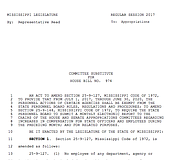Rep. Angela Cockerham, D-Magnolia, presented House Bill 974 last week, which would move almost all state agencies out from under the State Personnel Board’s purview. Photo by Imani Khayyam.
Update: The House voted to not move this bill forward to the Senate this morning. The deadline to table a motion to reconsider is Monday, Feb.13, so there's still plenty of time to move it forward.
The majority of state employees could lose access to their employee appeals board and other human resources for the next three years if a bill to move most state agencies out from under the Mississippi State Personnel Board's purview becomes law.
Rep. Angela Cockerham, D-Magnolia, presented House Bill 974 on the floor last week, saying it was a result of lawmakers' meetings with state agency heads throughout summer 2016.
"The major benefit to the state ... is to allow the state agency heads to be able to run their agencies a little more efficiently, and it would also allow them to reorganize," Cockerham told House members last week.
The House passed the bill by a slim margin on Thursday, Feb. 2, and was held on a motion to reconsider. House Bill 974 had not passed to the Senate by press time.
Throughout the summer, state agency working groups met with department leaders to find "efficiencies" in their budgets. Then in November, the Joint Legislative Budget Committee presented fiscal-year 2018 plans to cut funds for new cars and out-of-state travel. In those summer hearings, some state agency heads indicated that moving out from under the state personnel board might help them find cost savings, after the lieutenant governor or speaker asked them directly.
Rep. Tyrone Ellis, D-Starkville, asked Cockerham if the bill was a step toward privatization of services.
Cockerham said it was not.
"I think at some particular point the House and the Senate (are) going to have to decide how big we want our footprint for the government to be and how we're going to attract businesses to our state for our state employees and for the private economy as well," Cockerham said. "It's not a step toward privatization—we give the department head the authority to say this is how I want my (agency to run)."
Losing the Appeals Board
Under the legislation, state agency heads could still increase salaries of any worker in their department, a problem that Cockerham said lawmakers could deal with in each agency's appropriations bill. State agencies would have to report salary increases to chairmen of the Senate and House Appropriations Committees and the Legislative Budget Office if the bill becomes law.
Lawmakers concerned about the legislation asked what legal recourse state employees would have without the employee appeals process that is part of the state personnel board. Cockerham explained that state agency officers would have to go to the attorney general's office before making any terminations to ensure that they follow state and federal law.
Mississippi is an at-will state, meaning employers can hire or fire someone for any reason except those prohibited in federal laws like the Civil Rights Act of 1964, which prohibits discrimination. Federal complaints can still be filed at the Equal Employment Opportunity Commission. The attorney general's office released a statement about the legislation."The current version of the bill requires agencies to consult with our office before taking personnel action. When it comes to a person's employment, any action could have life-altering consequences. Our office will make every effort to ensure that any action taken complies with state and federal law; however, our office is also dealing with budget cuts that may result in fewer attorneys to sufficiently advise these agencies," Attorney General Jim Hood said.
Rep. Steve Holland, D-Plantersville, spoke vehemently against the bill, and his amendment to make the bill take effect in 2018—not July 2017—was the only one that failed.
"It is absolutely pre-destined and preordained that the majority in this Legislature wants to give all the power in this state to the governor. Now if you like that, and you feel good about that for the 26,000 people you were elected to represent, then continue onward, brothers and sisters, and answer to the music," Holland said.
'More Cuts Coming'?
After an hour of debate, lawmakers offered amendments to keep some state employers under the state personnel board, including law enforcement officers in the Department of Public Safety and the Department of Wildlife and Fisheries, school attendance officers and the Department of Mental Health.
Rep. David Baria, D-Bay St. Louis, offered an amendment to keep the Department of Mental Health under SPB, largely because it has more than 7,000 employees.
"Those who work in state agencies are paid less than they are paid in the public sector," Baria said on the floor. "They've got a good health insurance plan and a good retirement plan and the protections of the state personnel board; we gave them that promise when we gave them that job, and I think it's wrong to pull the rug out from under them."
The chairman of the House Appropriations Committee, Rep. John Read, R-Gautier, asked the House to vote against Baria's amendment, saying agencies need the flexibility outside the personnel board's purview due to tight budgets. In January, what Read called the state's typically busiest month, revenue was down $18 million.
"When cuts come, and revenue is down, somebody has to go, that's reality," Read told the House.
"We've tried to give agencies flexibility ... the reality is there could be more cuts coming. Give them a chance to move people without cutting folks."
Baria's amendment passed despite Read's plea by a vote of 61-59. The bill itself passed by four votes but was held on a motion to reconsider and had not passed to the Senate by press time.



